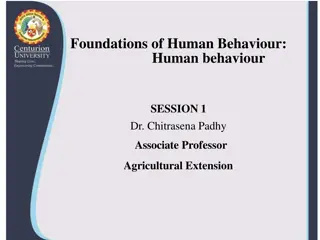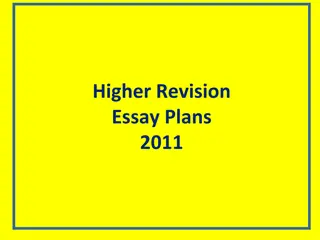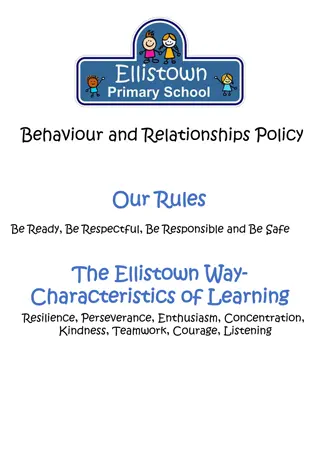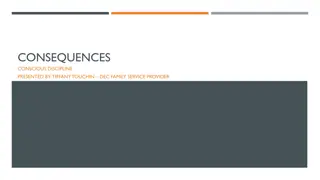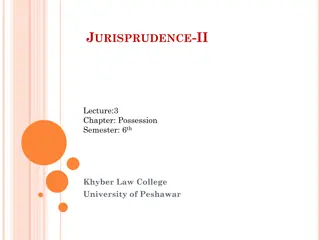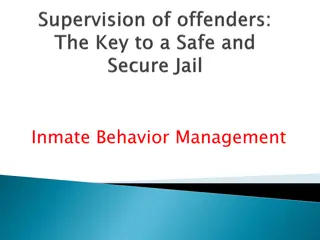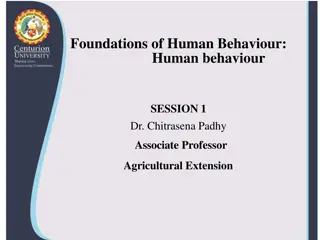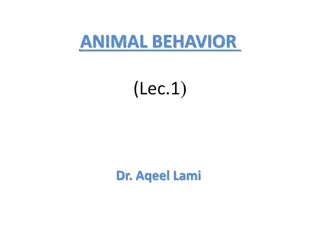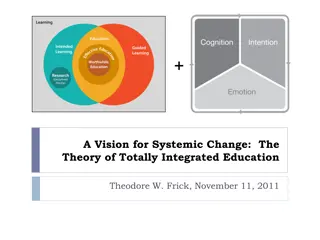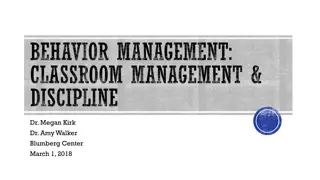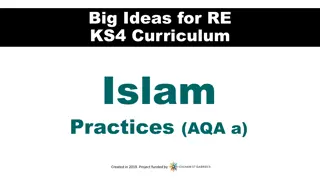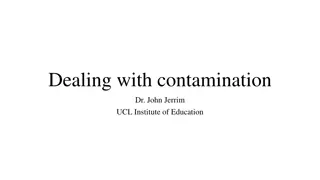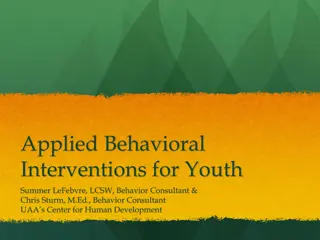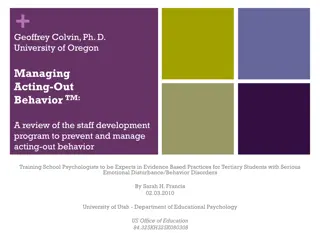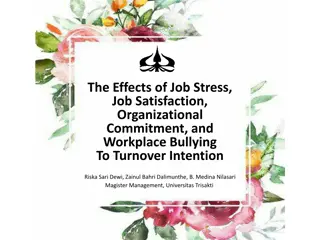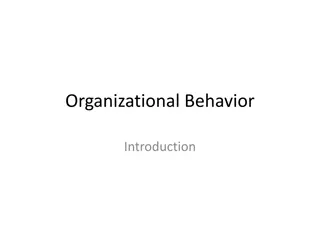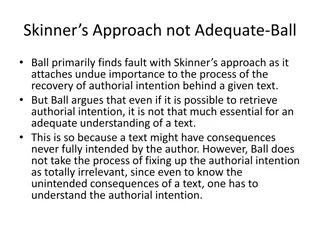Positive Behavior Support Interventions in Education
Learn about Tier 1 Positive Behavior Interventions & Supports (PBIS) developed by California State University and LA Unified School District. Explore evidence-based strategies like effective transitions, praise, choice-making, and establishing routines to promote positive behavior in students. Disco
1 views • 10 slides
Function Based Thinking
Function-based thinking in Missouri Schoolwide Positive Behavior Support, emphasizing data-based decision-making, mission clarity, and effective teaching practices. Understand how behavior is related to the environment and how environmental interventions play a key role in shaping expected behaviors
6 views • 27 slides
Addressing Predatory Behavior in the Fellowship
Predatory behavior, especially towards vulnerable members, is a concerning issue in the fellowship. This behavior includes unwelcome advances, exploitation of power dynamics, and institutional sexism. The discussion on predatory behavior necessitates honest dialogue and a united approach for a safer
3 views • 13 slides
Understanding Human Behavior: Foundations and Complexity
Human behavior encompasses the actions and interactions of individuals influenced by factors like genetics, culture, and situational contexts. It involves observable overt behaviors as well as hidden covert behaviors, with a dynamic interplay between individuals and their environments. Psychologists
8 views • 20 slides
Creating Trustworthy Green Hotels Around Oceans
This paper examines the impact of green service attributes on consumer trust in sustainable green hotels around oceans. The study focuses on 12 certified green hotels in India and explores how Green Service Encounters influence consumer trust and re-patronage intention. The findings reveal that trus
7 views • 6 slides
GD Bart Puppy Test: Behavior Scoring System Overview
The GD Bart Puppy Test is a standardized behavioral scoring system designed for puppies at 8 weeks of age, focusing on 21 test components to predict success in canine behavior. Conducted by a team of 3 people, the test evaluates stress signals and responsiveness levels to various stimuli. Multiple e
6 views • 15 slides
Understanding the Role of Board-Certified Behavior Analysts in Supporting Students with Autism in PA School Programs
Pennsylvania Training and Technical Assistance Network (PaTTAN) plays a crucial role in supporting students with autism through the efforts of Board-Certified Behavior Analysts. The increasing number of students eligible for IEPs under the definition of autism necessitates skilled educators who can
0 views • 20 slides
Influencing Factors on Voting Behavior: A Comprehensive Analysis
In the realm of voting behavior, factors such as media, social class, age, gender, and more play critical roles. This essay delves into the complexity of factors influencing voting behavior, assessing their relative importance and the balance of their impact. The discussion includes models of voting
0 views • 12 slides
Behavior and Relationships Policy at Ellistown Primary School
Ellistown Primary School aims to create a safe and respectful environment where everyone is ready to engage in learning. The Behavior and Relationships Policy emphasizes positive behavior reinforcement, clear boundaries, and promoting self-esteem. It focuses on fostering good citizenship, teaching s
0 views • 11 slides
Understanding Psychological Theories of Criminal Behavior
Psychologically-based criminologists attribute criminal behavior to individual factors such as negative early childhood experiences and inadequate socialization, leading to criminal thinking patterns and incomplete cognitive development. Probation and parole practices are influenced by rehabilitatio
0 views • 30 slides
Conscious Discipline & Learning: Power of Intention and Skill of Consequence
Understanding the importance of creating a safe and connected environment for learning, the power of intention in viewing mistakes as opportunities for growth, and the skill of learning from consequences. Emphasizing natural consequences as powerful tools for behavior learning.
0 views • 7 slides
Understanding Possession in Jurisprudence
Possession in jurisprudence is defined as the closest relationship between a person and a thing they possess. It involves physical control and the intention to exercise that control. Various legal scholars have provided definitions to explain the concept of possession, highlighting the significance
0 views • 19 slides
Understanding Consumer Behavior in Marketing
The design of a marketing program starts with understanding consumer behavior. Consumers, as the end users, play a crucial role in shaping market trends. Producers seek insights into consumer personas, market behaviors, and influencing factors. Management focuses on the consequences of consumer beha
2 views • 26 slides
Understanding Psychology: The Science of Behavior and Mental Processes
Psychology is the scientific study of behavior and mental processes. Psychologists study both observable behavior and private mental processes. The primary goals of psychology are to describe, understand, predict, and control behavior. Different branches of psychology, such as applied psychology, cl
2 views • 29 slides
Understanding Inmate Behavior Management in Correctional Settings
Inmate Behavior Management in correctional facilities involves supervising inmates, implementing corrective discipline, and fostering a fair and consistent environment. It emphasizes the importance of behavior management plans, identifying undesirable traits in supervision, and passing educational a
0 views • 19 slides
Understanding Human Behavior: Foundations and Factors
Human behavior is a multifaceted subject influenced by genetic makeup, culture, and individual values. It encompasses both overt actions and covert thoughts, a product of the individual and environmental factors. Psychologists study behavior from visible (overt) actions like playing football to inne
0 views • 20 slides
Understanding Culpability and Intention in Criminal Liability
Culpability is essential in determining criminal liability, going beyond mere action to include a blameworthy state of mind. Factors such as mental illness or age can impact culpability. Intention, comprising cognitive and conative elements, plays a crucial role. Different forms of intention, includ
2 views • 24 slides
Understanding Normal and Abnormal Behavior: Perspectives and Definitions
Normal behavior varies from person to person and society, influenced by individual preferences and societal norms. Abnormal behavior is characterized by an inability to function effectively or personal discomfort. The concept of normality and abnormality in psychology raises complex questions about
2 views • 8 slides
Impact of AI on Electric Vehicle Purchase Intention in China
Exploring the influence of artificial intelligence (AI) on the purchase intention of electric vehicles (EVs) among consumers in China. The study delves into factors such as perceived usefulness, ease of use, enjoyment, cyber risks of AI, and their effects on EV purchase intent. It also highlights th
1 views • 22 slides
Understanding Human Behavior: Insights for Social Workers
This material delves into the intricacies of human behavior, exploring factors influencing behavior such as heredity, environment, intelligence, needs, and motives. It covers the concept of human behavior, stages in life from conception to old age, and theories of human development by eminent psycho
2 views • 71 slides
Understanding Animal Behavior and Ecology
Animal behavior encompasses a range of activities such as feeding, breeding, and social interactions. Ethology focuses on studying behavior in natural environments, while behavioral ecology examines ecological aspects like predator-prey interactions. Sociobiology delves into the evolution of social
3 views • 5 slides
Enhancing Education Through Totally Integrated Approach
Theodore W. Frick's Theory of Totally Integrated Education (TIE) emphasizes aligning student cognition, intention, and emotion with authentic learning tasks to create worthwhile education. TIE focuses on systemic change in education and provides a vision for improving learning outcomes by connecting
0 views • 55 slides
Understanding Wound Healing Process by Secondary Intention
Exploring the stages and characteristics of wound healing by secondary intention, including open wounds, infection risks, necrosis, and non-suturing methods. Learn about the initial, inflammatory, granulation tissue formation, wound contraction stages, as well as potential complications like pigment
0 views • 12 slides
Understanding Wound Healing Processes
The body's response to injury involves two main processes of wound healing - regeneration and repair. Regeneration involves proliferation of parenchymatous cells, while repair results in fibrosis and scarring by proliferation of connective tissue. Different types of cells play varying roles in the h
0 views • 12 slides
Understanding Behavior Management in Classroom Settings
Explore the essential topics of behavior management, classroom strategies, and discipline in educational settings. Delve into the functions of behavior, impact of trauma on learning, and effective management techniques. Learn how to identify underlying reasons for student behaviors, discuss behavior
0 views • 76 slides
Exploring Ethical Value of Intention and Action in Islamic Practices
Delve into the significance of intention and action in Islamic practices, focusing on prayer in Islam. Understand the ethical aspects of intentions and actions, and how they shape beliefs and behaviors. Explore the nuances of intentionality in kindness and unkind acts through thought-provoking scena
0 views • 5 slides
Understanding Section 34 in the Indian Penal Code
Section 34 of the Indian Penal Code deals with acts done by several persons in furtherance of a common intention. Common intention involves a prior agreement among offenders to commit an offense, requiring active involvement of all. Key points include pre-arranged planning, participation of two or m
0 views • 10 slides
Understanding Contamination in Research Studies
Understand the concept of contamination in research studies, its impact on the effectiveness of Randomized Controlled Trials (RCTs), and different analysis methods to handle contamination, such as Intention-to-Treat (ITT) and Contamination-Adjusted Intention-to-Treat (CA-ITT) analyses. Learn how to
0 views • 40 slides
Targeting Emotions to Facilitate Behavior Change in Older Adults
Efforts in changing health behavior have traditionally focused on social and cognitive factors, but recent evidence highlights the importance of affective states in decision-making and behavior change. Janey Peterson discusses the role of emotions in achieving and sustaining behavior change to benef
0 views • 11 slides
Understanding Theft Offences: Elements and Case Law
Theft offences, including theft and robbery, are defined under the Theft Act 1968. A person is guilty of theft if they dishonestly appropriate property belonging to another with the intention to permanently deprive them of it. The elements of theft involve actus reus (appropriation) and mens rea (di
0 views • 26 slides
Grading Criteria for Effort and Behavior in Educational Reporting
Effort and behavior in educational settings are evaluated based on criteria ranging from Excellent to Causing Concern. Pupils demonstrating excellent behavior show respect, responsibility, and positive engagement in learning. Those with good behavior exhibit cooperation and respect for others, albei
0 views • 9 slides
Understanding Applied Behavior Analysis (ABA) for Youth Interventions
Applied Behavior Analysis (ABA) is a science focusing on improving human behavior by increasing desired behaviors, teaching new skills, and generalizing behaviors. ABA emphasizes observable behaviors, measurement of behavior change, and the use of interventions in various settings like classrooms an
0 views • 25 slides
PBIS Expectations and Behavior Flowchart
The PBIS flowchart outlines behavior expectations and interventions for minor and major incidents in a school setting. It covers disrespectful behavior, disruption, defiance, property damage, theft, possession of weapons, and more. The flowchart guides teachers and staff on managing and addressing s
0 views • 6 slides
Managing Acting-Out Behavior: A Staff Development Program Review
This review discusses a staff development program created by Geoffrey Colvin, Ph.D., from the University of Oregon, focusing on preventing and managing acting-out behavior in students with emotional disturbance or behavior disorders. The program includes video presentations, strategies for behavior
0 views • 22 slides
Effects of Job Stress, Job Satisfaction, Organizational Commitment, and Workplace Bullying on Turnover Intention
The research examines the impact of job stress, job satisfaction, organizational commitment, and workplace bullying on turnover intention in a competitive insurance company. High turnover rates can hinder organizational performance and goal achievement. Preliminary survey data at PT Prudential (2017
0 views • 9 slides
Impact of Compensation, Career Development, and Job Satisfaction on Nurse Turnover Intention
The research study examines the influence of compensation and career development on job satisfaction and its subsequent impact on nurse turnover intention in a private hospital in Yogyakarta, Indonesia. The findings indicate that addressing issues related to compensation, career advancement, and job
0 views • 10 slides
Influence of Watching Makeup Videos on Behavior Intention in China
The research explores the impact of younger generations watching makeup videos on their makeup intention in China, focusing on the gap between social media consumption and behavior intention. It delves into the role of online influencers, media usage in makeup trends, and the concept of active audie
0 views • 12 slides
Understanding Organizational Behavior and Individual Behavior
Organizational Behavior (OB) is a multidisciplinary field that combines knowledge from various disciplines to study and manage organizations effectively. It emphasizes the application of this knowledge to enhance organizational effectiveness and the well-being of participants. OB is a useful concept
0 views • 38 slides
Function-Based Behavior Support Plans: A Comprehensive Guide
Explore the process of developing Function-Based Behavior Support Plans (BSP) using Functional Behavioral Assessment (FBA). Understand the concepts of function and functional behavior assessment, learn how FBA/BSP fits within a multi-tiered support system, and practice developing BSP for students. D
0 views • 74 slides
Exploration of Authorial Intention and Text Reception by Terence Ball
Terence Ball critiques Skinner's emphasis on authorial intention recovery, highlighting how understanding unintended consequences of texts is crucial. He delves into the significance of reader interpretation, proposing a theory of three-cornered fight to navigate diverse perspectives in text analysi
0 views • 11 slides



